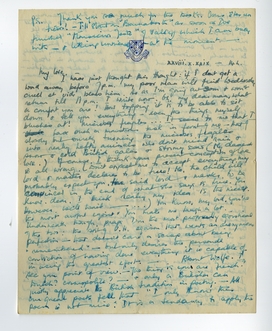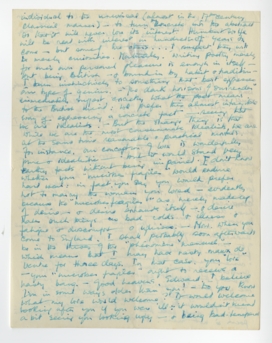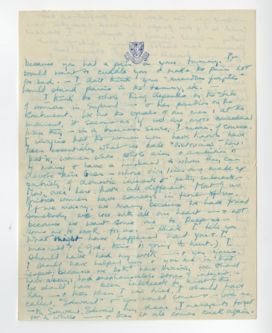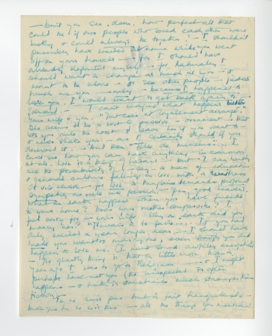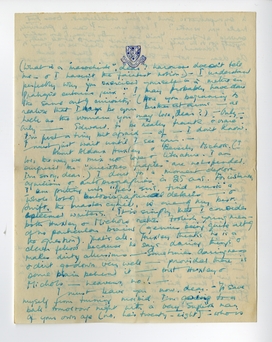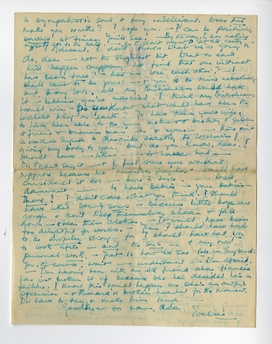Evelyn Blackett
aan
E. du Perron
Oxford, 28 oktober 1929
xxviii. x. xxix - 14h.
My love, -
I have just thought this thought: if I don't get a word away before 7 p.m. my poor man will find Wednesday cruel et vide, bless him. As I'm going out soon & won't return till 11 p.m. I write now. Oh, my dear man, what a comfort you are! How topping it is to be able to sit down & tell you everything - even the things myself blushes at! Microbes fragiles... It seems to me that I have such a monstrous task in front of me - that of slowly but surely turning the microbes fragiles into really hefty animals who don't mind rain & snow & cold British gales & stormy seas (My dearest love.) Of course, I think your present conception of love is all wrong. (Don't expect me to accept everything my lord & master declares to be true! No, the child will probably expect you, the said lord & master, to be convinced in the end of what she says is true. You know, dear, I think really my idea is the nicest. However, we'll wait - ...) You know, my lord, you're the most awful egoist & you make me laugh a lot. Underneath though, praps I'm the most profoundly egoistical of the two: the sort of U.H. egoism that wants an anonymous perfection - that doesn't care a scrap about being ‘remembered’ - but only desires the personal conviction of having done everything it is capable of in using the greatest effort. - About Wolfe, I see your point of view. - The thing is you are French? Dutch? Cosmopolite? - & only a Britisher can justly appreciate the British tradition in poetry. - All our great poets tell that ‘I only know this poem is not mine.’ It is a tendency to apply the individual to the universal (almost in the 17th century classical manner) - to turn the concrete into the abstract so that it will never lose its interest. Humbert Wolfe will be read with interest in hundreds of years to come - but some of the others... I suspect they will be merely curiosities. Naturally, writing poetry merely for one's own personal pleasure is enough in itself - but being British - & bound in by habit & tradition - I turn instinctively to something that best expresses our type of genius. - ‘The dark horizons of surrender’ immediately suggest exactly what the poet means to the British mind: we prefer this almost intangible way of expressing a concrete fact - seeing that we are idealists. - But the strange thing is that while we are the most consummate idealists, we are at the same time reasonable & practical mortals. For instance, our conception of love is wonderfully pure & idealistic - but it would stand very earthy facts without being impaired. I don't know whether your ‘microbes fragiles’ would endure hard wear: in fact, you say you would prefer not to marry the woman you loved - evidently because the ‘microbes fragiles’ are merely made up of desire - & desire exhausts itself - & desire hates such things as bad colds & illness & fatigue & discomfort & ugliness. - Now, when you come to England, I shall probably soon afterwards be in the throes of the ‘phénomène mensuel’ - which means that I may have nasty maux de ventre for three days. In that case, your ‘love’ - your ‘microbes fragiles’ ought to receive a nasty bang. - Good heavens, Edward, I believe I'm in some ways older than you! - Do you know what my love would welcome? It would welcome looking after you if you were ill: it wouldn't mind a bit seeing you looking ugly - & being bad-tempered because you had a pain in your tummy. It would want to cuddle you & make the pain not so bad. - I don't think your ‘microbes fragiles’ would stand pains in the tummy etc. -
I think the whole thing depends on the state of woman in England - & her position on the Continent. We are the equals of our men: at the moment, it seems as if we are more considered than they - in a business sense, I mean, of course. I imagine that the women you have known have been essentially what we call ‘Victorians’ here that is, women whose whole aim & ambition is to marry & have a husband to whom they can devote their lives - whose own lives are made up entirely of domestic interests & petty interests. - Now, over here, that's all different. Most of us British women have careers in front of us. If we marry, we marry because we have found somebody we love with all our heart - & not because we want some one to keep us - some one to work for us. - Shall I tell you what might have happened had you & I married? (God, this is going to hurt.) I should have had my work - & you yours. I should have helped you & you me in that respect: because we both have brains, we should have always had inexhaustible stores of interest. - We should have been intellects for most of the day - & then when I was tired, I should have called ‘Edward’ & you would come & - love me, - oh Edward, Edward, my dear I manage to forget for a while - & then it all comes back again - don't you see, dear, how perfect all that could be if two people who loved each other - were lucky & could always be together? - I shouldn't passively have waited at home while you went off on your travels - for I should have already departed myself - for naturally I should want a change as much as you - & want to be alone - or see other people - just as much as you - only - because I happened to love you. I would want to get back again to - Edward. - I can't imagine what happens with your wife & you. ‘Tout ceci est loyalement arrangé’. She seems to be a sort of passive - ornament - that lets you rule the roost & leave her if you want to - & never shake you - as I certainly should if you deserved it. - And then ‘fille de mineurs.’... I can't see how you can have anything in common at all. Love is a thing of hazard - but I can hardly see the possibility of - say - a man of education & general culture falling in love with a waitress or vice versa - for love à l'anglaise demands profound sympathy as well as passion. - Then, good heavens, what on earth happens when you have friends to your home? Does your mother supervise? I feel sorry for - your wife. Why on earth did you marry her? ‘J'avais à le faire.’... If you had only waited a year long, dear, - I should have made you want to marry me, even though you did happen to love me. (I must sound awfully energetic! - The ghastly thing is that a little more than a year ago I was to go to Belgium - & I might perhaps have met you (the unexpected so often happens - & truth is sometimes much stranger than fiction). -
Je ne suis pas tout à fait tranquillisée - bien que tu ne sois pas - all the things you mentioned. (What is a ‘masochiste’, dear? Larousse doesn't tell me - & I haven't the faintest notion.) I understand perfectly why you exercised yourself in a ‘mettre en pratique certains jeux.’ I may probably have done the same out of curiosity. (Are you beginning to realise that I may be your brother at arms - as well as the woman you may love, dear?) - Only - only - Edward, to be really frank & ‘vraie’ I'm just a tiny a bit afraid - of - I don't know. I must just wait until I see you. -
About Aldous Huxley & Beverly Nichols. (I love the way we mix up love & literature. I am surprised the ‘microbes fragiles’ are not offended. I'm sorry, dear.) I don't for a moment deplore cynicism & autobiographies à 25 ans. For instance, I am putting into ‘Here, sirs, find music’ a whole lot of autobiographical details - & Swift, the master cynic, is one of my best esteemed writers. It is simply that I consider both Huxley & Nichols rather foolish young men - of no particular brains (genius being quite out of the question). That's all. Huxley thinks he is a clever fellow because he says daring things & makes dirty allusions. - Sometimes daringness & dirt go down very well - provided there is some brain behind it - but Huxley & Nichols - heavens, no.! -
I must leave you now, dear. - To save myself from turning morbid. I'm going to a ball tomorrow night with a very English man of your own age (no, he's twenty-eight) - who is a sympathetic soul & very intelligent. Does that make you writhe? I hope you. - I can be positively savage at times. You'll see. - By the way, I am making myself go to the ball. - As I don't want to at all really. -
Edward, I don't know what we're going to do, dear - not the slightest bit. What on earth will happen supposing we find that our instinct has been true? - that we love each other? - I shall want to be yours - & you to be mine - absolutely, but & my love, all my Britishness would hate it - because you're married. I think my Britishness would win. - Do you know what would have been the loveliest thing on earth? To have been your wife, to have been able to be your mother & brother & sister & friend & business man - & your - - there isn't a word in English to describe exactly the loveliness of giving my body to you. And do you know, dear, I should have - liked - to have had - Oh I can't say it - & I feel sure you wouldn't approve because the ‘microbes fragiles’ would have considered it too - terre à terre. - Well, dammit - to have babies - your babies - There! I don't care what you think. I should have liked lots of sons - because little boys are rough & don't keep themselves clean & fall down - & tear their clothes. - It would have been too delightful for words. - Then I should have had to be awfully strong - for I should have had you to look after - and the sons - & my own personal work. - That is how we see love in England. You, of course, won't - understand - I'm afraid.
- I'm having tea with an old friend whose fiancée has just broken it off because she had decided he's a failure. I knew this would happen as she's an awful specimen - & Richard is broken-hearted for the moment. I'll have to try & make him laugh. -
Goodbye for now, dear.
Eveline. -
P.S. Thank you so much for the books. Vous êtes un trésor! - I'll start on Barnabooth as soon as I've finished Monsieur Teste by Valéry which I am busy with - liking intensely - at the moment. -
Origineel: Den Haag, Letterkundig Museum
 vorige
vorige 

